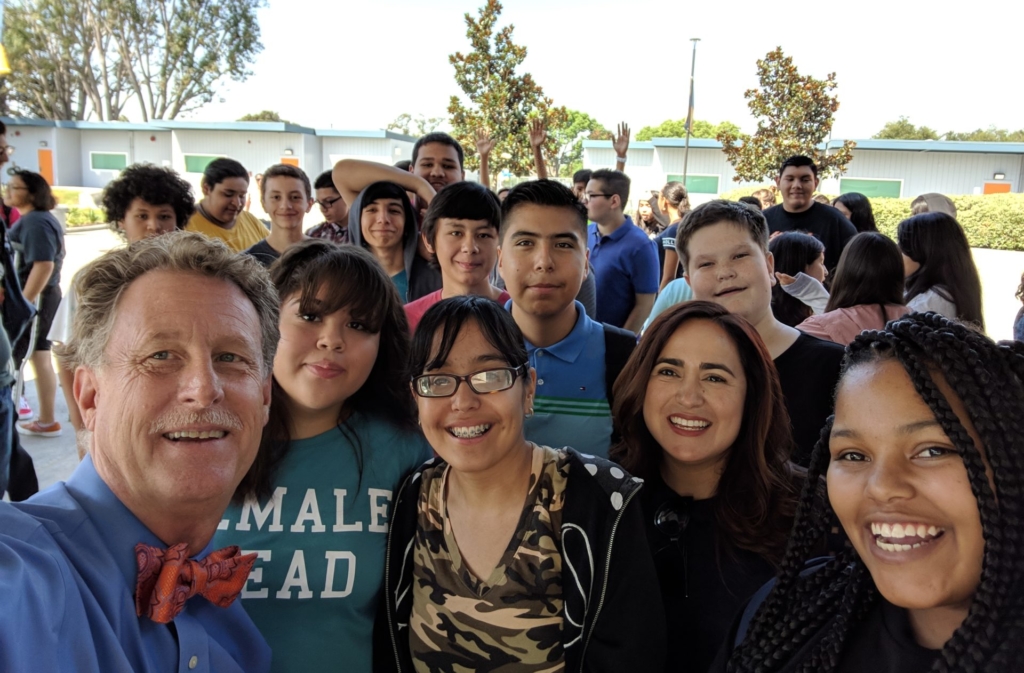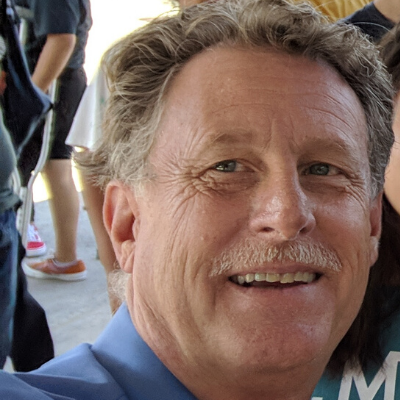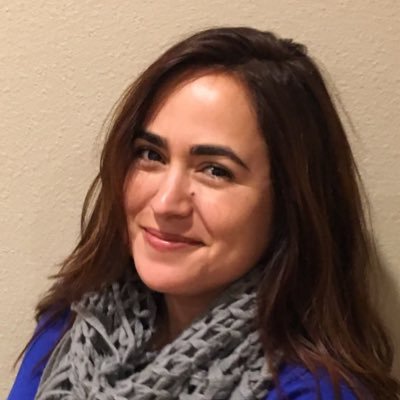Right now, our students and advisors have an energy I haven’t seen before. What’s happening right now has activated their will and hunger for change.
Becky Perez, Academic Dean and Co-Founder, Odyssey STEM Academy
Education Reimagined caught up with Keith Nuthall, Co-Founder of Odyssey STEM Academy, in mid-May to learn more about Odyssey’s founding and their learner-centered community. One week later, the news of George Floyd’s murder and the resulting national and global protests became the focal point of our everyday conversations. We reengaged with Keith and Odyssey’s fellow Co-Founder, Becky Perez, to speak directly about what new observations they’ve had about their work at Odyssey and how this newfound awareness will act as a catalyst for iterating their learner-centered structure.
The following Q&A is split into two parts. The first is with Keith and Becky and was conducted on June 17th, 2020. The second is with Keith and was conducted on May 19th, 2020.
June 17th, 2020
Q: What’s speaking to you about the current national conversation around racial injustice?
Becky: Many things speak to me, and I know many educators who are having similar thoughts. We’re devastated by the recurring volume of racial injustice we see nationally and locally; it is coming from so many fronts. There’s a side of me that is overwhelmed and full of grief. And, there’s a side of me that retains hope.
When I look at my students, their families, California, the nation, and the world, something is happening I’ve never seen before. From the sheer number of people involved in the protests to the local actions being taken across the country, the impact could be incredible. It’s a powerful example for our students who come into Odyssey STEM Academy, where it is part of our mission to empower them to change themselves and the world.
Right now, our students and advisors have an energy I haven’t seen before. What’s happening right now has activated their will and hunger for change. It shows me that when they are exposed to injustice, they awaken.
Keith: Reflecting on the last couple of weeks, as a person of privilege, I have to ask, “Have I been doing all I can do to help our young people, community, or nation? Or, am I being compliant within the systems that have created this injustice?” Then I wonder, “Why have I only been wrestling with this in the past couple of weeks?” I have to start thinking about the difference between being compliant and being anti-racist.
I’ve been in a school leadership role for over 10 years. When I look back at some of the critical points where I and other leaders had to make big and difficult decisions, I have to reconsider if my decisions actually created a safe and welcoming environment for our families and community members.
During the run-up to the 2016 Presidential election, it became ok for the kids to say anything they wanted to say. That slowly turned into student-led protests, which brought up questions from the community about if and when students should be allowed to organize and have their voices heard. Some people didn’t believe students had the right to protest. And, operating within a district, the ultimate decision had to come from district leaders. When those decisions are made, I now wonder, where do I step in and say, “I don’t accept that.”
Q: What are you now thinking about how Odyssey’s own structure can better address systemic racism?
Becky: When we designed Odyssey, we were really intentional about eliminating institutional racism within our learning community. There’s a part of me that feels really proud about that piece, but when I get comfortable with the things we do well, I stop looking for other ways we are blocking opportunities for certain groups of students.
Part of our responsibility is to consistently ask the people who live in our systems what is blocking them or impacting them negatively that we might not be aware of. And, we have to provide them the tools to see and articulate that. It can be as invisible to them as it is to us. They might feel hurt but not yet know what the cause is.
We’re at a point now where we clearly see the gaps in our own structures and programs. It only took one or two days after the murder of George Floyd before our scholars began speaking up about the racism they see in our school. But, “what’s next” isn’t yet clear. We’re at the awareness stage.
Keith: An interesting and difficult question we’ve faced regarding racism within our learning community is: When do you provide safety, and when do you offer an opportunity for learning? I don’t think it’s an either or choice.
Earlier this year, we had scholars who experienced hate speech from their peers and felt their peers should be removed from the learning community. Becky and I faced a difficult decision. We feel our role as educators is to help a scholar who commits such an action to understand what that hate speech means and help them come to a new place. But, we value the safe community we create at Odyssey and have to manage the tension between educating them or seeking alternate placement.
It’s a hard conversation to have. When someone speaks that way against you, your family, and your heritage, some in our community may want them removed . And, we don’t tolerate hate as a community, so what’s the solution? We focus on having a restorative climate where scholars have to engage in the difficult conversation about why their actions may have hurt their peers. It’s more difficult than handing down a suspension. The restorative conversation is an essential part of bringing healing to a hurting community.
Becky: One of the learnings we’ve had is that these restorative conversations aren’t enough. Earlier in the year, we conducted race-related conversations and taught our scholars about the difference between being an active participant and being a bystander. I feel an enormous weight right now knowing we need to do more. And, at the same time, I’m hopeful our scholars will continue leading the way with us in making the changes that need to be made.
May 19th, 2020
Q: What path led you to the learner-centered work you’re co-leading at Odyssey STEM Academy?
Keith: I spent the first 12 years of my 35-year career as a classroom teacher and instructional specialist at big comprehensive high schools in southern California. During that era, I focused on helping educators implement technology-enhanced project-based learning, known as WebQuests. That work was my introduction to constructivist learning—a term you don’t often hear today but one that parallels learner-centered learning.
My WebQuest work opened a new phase in my career by supporting district and state leaders reimagine schools and learning environments, while working at Education Development Center (EDC) and San Diego Unified School District. We learned creating smaller schools and theme-based learning pathways was messy work and led to unexpected outcomes. Learning in a smaller school didn’t necessarily equate to personalization and career pathways did not always make learning more relevant. In fact, these structures often lead to tracking learners into homogeneous groups and limit learning exploration. These models certainly worked for some young people, but fell short for far too many.
After several years, I was given the opportunity to work with local communities to design two new high schools, Del Lago Academy and Odyssey STEM Academy. It’s not often people get a second and third chance to apply lessons learned. I’ve been fortunate.
Q: How would you describe the culture of learning at Odyssey?
Keith: We’ve discovered that learning is much more powerful if you take an individual student’s passion and interest into account, then construct learning opportunities around what excites them. While this is not easy, it is rewarding for the learner and advisor. I now recognize that it was a missing piece in my previous work and know we were limiting the learning possibilities.
As a Big Picture Learning school, we’re changing the paradigm on campus away from teacher-directed and assessment-as-an-event, and moving towards helping learners gather real-world evidence from anywhere and build their knowledge through these experiences. That puts our teacher advisors in an entirely different space where they advise one student at a time, rather than create whole class lessons and projects based on teacher interests.
Q: How do you pull the community into your learning environment?
Keith: We have interesting partners at Odyssey that help us set up learning opportunities for learners inside and outside of the school walls—allowing them to be in the driver’s seat of their learning and really show what they know through learner interest driven projects and community internships. Like most of our sister schools in the Big Picture Learning network, we focus on leveraging the community around us to empower young people.
We do that through internships, which include everything from fixing cars to tracking behavior patterns in our city using GIS software. Connecting to scholar interest is powerful. It gives them more perspectives to learn from, rather than being limited by the knowledge and opinions of the educators in a single building.
It’s important to note we don’t find internships for them. I previously learned at Del Lago Academy that when I handed internships to the students—there was far less impact and ownership. All of our scholars at Odyssey have resumes, make cold calls, and conduct informational interviews—they pound the pavement looking for a mentor with a common interest. Our advisors help them along the way—acting as coaches, rather than as conventional teachers.
We engage our community by actually putting the kids out there. This leads to partnership opportunities that naturally come our way. It’s priceless. It’s breaking down the barriers between community and school. Our scholars are awesome. They do things that people don’t think a 14-year-old can do. They make real changes in the organizations they intern for and commonly get the reaction, “A 14-year-old came up with that?”
Q: How does project-based learning play out at Odyssey?
Keith: One of the challenges we have at Odyssey is getting kids to think about their interests and passions and not about the career they’ll one day have. That’s a key turning point for many kids. They are used to enacting projects built for them by teachers. Connecting learners with a community mentor, engaged in a common interest results in authentic learning. There is nothing fake about it. I learned throughout my career that high school doesn’t have to be practice, it can be the real thing. These real student designed projects are the best way to measure competencies because scholars care.
As an example, we have a partnership with Food Finders, a local organization that collects surplus food from grocery stores to distribute to local areas of need. Odyssey learners are interning there and helping with the supply chain. Additionally, they are growing food on campus and experimenting with different ways to increase the quality and yield. This project-based learning experience both connects back to our on campus environmental sustainability complex and empowers young people to help those less fortunate. Powerful learning inside and outside school walls.
In other learning environments, where there may not be space within the school day to pursue your interests and passions, these young people may have never been exposed to the food distribution industry. Who knows where that experience will lead them in the future?
Q: Have you had an experience where a young person enrolled and realized Odyssey wasn’t a fit for them?
Keith: We lose very few students, but some think: “This is overwhelming for me.” In a small school you can’t hide. You have this group of advisors and staff that is there to support you all the time. Some young people don’t thrive in an environment where they are being asked, at every corner they turn, “What’s your idea?” “How can we help you?” They prefer an environment where they can be more anonymous.
A school like ours is challenging because it requires scholars to think for themselves. Some young are more comfortable with being a compliant, passive learner and struggle with developing their voice. The learning process is hard on their self-esteem and given another choice choose an easier high school option.
When every kid is known, there’s a different kind of accountability. There’s accountability on the advisor and there’s accountability on the student—now the student has a relationship with someone, and they don’t want to let them down. It’s a different dynamic, and some young people are not ready for that.
When somebody asks about the ideas you have or your needs and wants, that’s a lot harder to interact with than someone saying, “Here’s a math book. Do problems one through ten.” We’re asking students to stretch their thinking, to take on that empowerment, to come up with original ideas and thoughts, and to share who they are, their feelings, and how they’re doing.
There’s also the other part—at a school like Odyssey, you’re not getting the same kind of high school-as-Americana experience. We don’t have a marching band or athletics, but we do everything we can to have school spirit. We’re trying to substitute different types of activities that we think are more empowering, and allow them to really be themselves. But, it’s hard to communicate sometimes.
Q: What do you wish you were asked more often about the work happening at Odyssey STEM Academy?
Keith: I wish they’d ask: What’s the engine that drives the teacher advisors to lay themselves out there and be incredibly vulnerable with their scholars? They must show humility at all times. Also, what’s driving advisor courage? They are amazing people doing their very best for young people, and they demonstrate a lot of love for the kids.
People say it’s not scalable because teachers won’t do it. I don’t believe that. I believe that people go into this work because they love kids and they want to make a difference. There are very few people that go into education because they get a long summer break. We are often asked: “How do you ignite that passion in teachers?” Every year at Odyssey, we spend considerable time talking about and journaling on our values—values like vulnerability, humility, courage, joy, and excellence.
We live our values. As a staff, we ask: “How do you come together and make an environment that wraps its arms around its kids and gives them a hug every day and then helps them?” We want to help our scholars design their own life.


